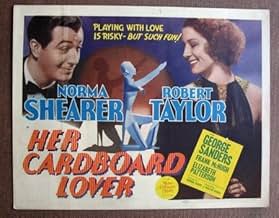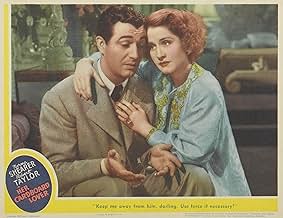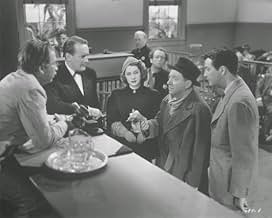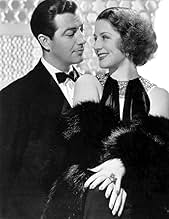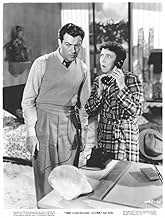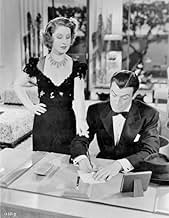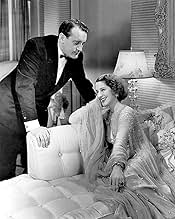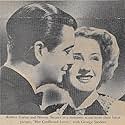Añade un argumento en tu idiomaA wealthy woman, trying to discourage a former boyfriend from pursuing her, hires a young songwriter who needs money to pay off his gambling debts to pretend to be her boyfriend. The problem... Leer todoA wealthy woman, trying to discourage a former boyfriend from pursuing her, hires a young songwriter who needs money to pay off his gambling debts to pretend to be her boyfriend. The problem is that the phony boyfriend is really in love with her.A wealthy woman, trying to discourage a former boyfriend from pursuing her, hires a young songwriter who needs money to pay off his gambling debts to pretend to be her boyfriend. The problem is that the phony boyfriend is really in love with her.
- Dirección
- Guión
- Reparto principal
- Police Officer in Courtroom
- (sin acreditar)
- Waiter
- (sin acreditar)
- Casino Patron
- (sin acreditar)
- Elevator Operator
- (sin acreditar)
- Arresting Plainclothesman
- (sin acreditar)
- Drunk in Courtroom
- (sin acreditar)
- Casino Page
- (sin acreditar)
- Courtroom Spectator
- (sin acreditar)
- Casino Patron
- (sin acreditar)
- Croupier
- (sin acreditar)
- Dogar - Hotel Desk Clerk
- (sin acreditar)
- Casino Patron
- (sin acreditar)
Reseñas destacadas
This film's title invites the obvious and appropriate three-word review: "Her Cardboard Movie". It is most notable as the last film appearance for Shearer, one of the biggest stars in the world from "He Who Gets Slapped" (1924, playing another Consuelo) to "The Women" (1939). To be fair, this was likely the kind of Shearer film MGM believed audiences wanted to see. However, the part is unflattering.
Plucked and powered, Taylor and Shearer were better off in "The Escape" (1940). If Shearer had continued, she might have become a better actress than "leading lady"; apparently, she was no longer interested, and certainly didn't need the money. Taylor has a great scene, reciting Christina Rossetti's "When I am Dead, My Dearest" while threatening to jump from Shearer's balcony, as directed by George Cukor.
**** Her Cardboard Lover (6/42) George Cukor ~ Norma Shearer, Robert Taylor, George Sanders
Anyways, back to this version. In it Norma Shearer hires a lovestruck Robert Taylor (sporting a Bela Lugosi Dracula haircut with a point down the middle) to protect her from herself. Norma plays a Palm Beach vacationer hopelessly in love with a womanizer, played by, who else, George Sanders. Shearer hates that she can't control her desires for Sanders. Since Taylor owes her a gambling debt, he can pay it off by being Norma's secretary. His job doesn't involve typing. He's there to keep her away from Sanders, a job he performs too well, practically keeping her hostage in her own room. The chemistry between Shearer and Taylor is okay. But not as charged as her scenes with Sanders. You get the sense the two of them could have a happy open marriage. Shearer excels at playing liberated women (A Free Soul), (Private Lives). Norma wouldn't lose sleep over a philandering husband, as she would have her own trove of lovers. Of course, this is not Pre-Code Hollywood, which was something that worked in the favor of the 1931 version - "The Passionate Plumber".
I give Taylor credit for playing against type. Some of the comedic tropes for keeping Norma and George separated are funny, and some come across as creepy. This film has gorgeous sets, Harry Stradling's rich B&W photography, the elegant atmosphere, and of course Norma Shearer. But still, it just feels like the story is playing out in the wrong era.
Norma Shearer retired after this film. Apparently, during its making, someone said she had "jiggling grandma arms", and that was enough to have her hang it up at age 40. Although she still looked mighty fine to me.
To do this, she has Robert Taylor, a songwriter who's crazy about her, work off his gambling debt by pretending to be her boyfriend.
A nice dramatic role would have been better for Shearer's final performance. But like Garbo, she went out with a comedy, and one that bombed at that, also like Garbo.
One wonders what MGM was thinking. The dilemma seems to have been finding vehicles for these older stars as the world - and they - were changing.
The film was made in 1942, and though it is a delightful comedy, it really has the look and feel of the '30s to it. There are some wonderful scenes - one where Taylor threatens to jump over a balcony and a dandy fight scene at the end. But in spots, it seems a little tired.
Norma Shearer wears gorgeous clothes and is over-dramatic, which is what the part called for. Robert Taylor does a fine job, and George Sanders was wasted.
One of the comments said that Shearer was too old for the role - yet the actors seem properly matched and this writer, anyway, had no idea of Shearer's age.
In the end, though, it wasn't a fitting way for her to go out. The role hearkens back to a much earlier time. Perhaps, in the end, that's what she wanted.
It then went to the silent screen the following year with Marion Davies and Nils Asther in the leads and scored a modicum of success there. But the most bizarre adaption was yet to come. In 1932 the story was reworked for Buster Keaton and Jimmy Durante in the The Passionate Plumber. Irene Purcell is the female lead. Which brings us to the last and least version of this story.
I've a theory that Norma Shearer chose this vehicle to show Marion Davies that she could do one of her roles better. What other explanation could there be for turning down Mrs. Miniver as her farewell picture for this. And would you ever believe that Robert Taylor and Buster Keaton would play the same part on screen?
Shearer and Davies were a pair of feuding stars at MGM while Davies was there. Shearer was married to the boss, Irving Thalberg and Davies had her patron William Randolph Hearst who bought his way on to the lot. It's now conceded that Davies had a real flair for comedy, but that Hearst just could only see her as the heroine of many a drama. Shearer was a great dramatic actress who never quite scored in comedy. I'm betting for her final film she was going to show the retired Davies that she could do it better.
Well she didn't. In fact if any of P.G. Wodehouse's wit survived in this film, I must have dozed off. What emerges is a pleasant innocuous comedy which would have been long forgotten had it not been Norma Shearer's last film. When we first meet Shearer she's trying to fend off the advances of an amorous Taylor who has fallen in love at first sight. But later on she thinks he might be useful in fending off George Sanders's advances. She's trying real hard to dump the cad, but he's one charming rogue. So Norma hires Bob as Her Cardboard Lover to pretend he's the new man in her life. I think you can guess where this is going.
Shearer did not get quite the sendoff from the big screen that she thought she would have gotten, surely not anything like Mrs. Miniver would have been. For Taylor, he's pleasant enough, but if you want to see him and Shearer in much better form look at the 1940 film Escape.
¿Sabías que...?
- CuriosidadesFinal film of Norma Shearer.
- Citas
Terry Trindale: Who shall I say it's from, her lawyer?
Tony Barling: Lawyer? Hardly.
Terry Trindale: Well if this were bad news...
Tony Barling: Do I look like bad news?
- Créditos adicionales"The End. America Needs Your Money. Buy War Bonds And Stamps Every Pay Day."
- ConexionesVersion of El novio postizo (1928)
- Banda sonoraI Dare You
(1942) (uncredited)
Music by Burton Lane
Lyrics by Ralph Freed
Played during the opening credits and often as background music
Played on piano by Robert Taylor
Reprised on piano by Robert Taylor and sung by him and Frank McHugh
Sung a cappella by Norma Shearer
Selecciones populares
Detalles
Taquilla
- Presupuesto
- 979.000 US$ (estimación)
- Duración1 hora 33 minutos
- Color
- Relación de aspecto
- 1.37 : 1
Contribuir a esta página



